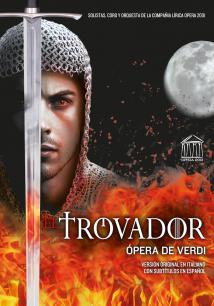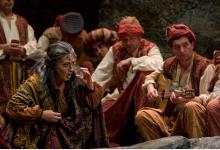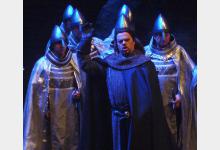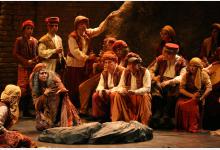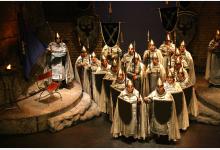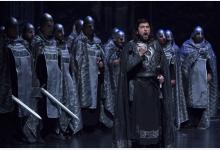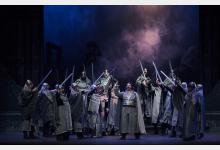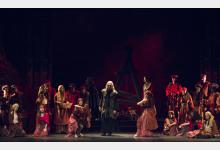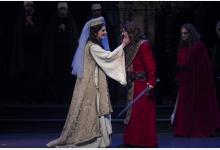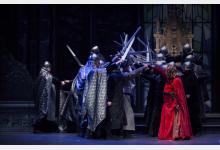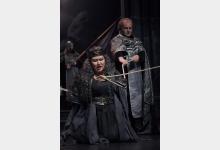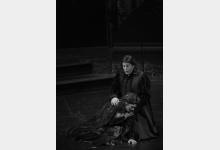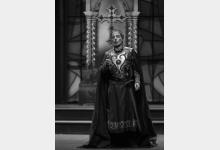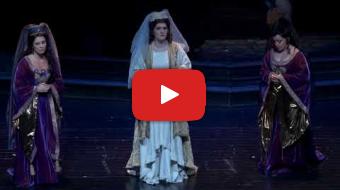- Español
- English
- Français
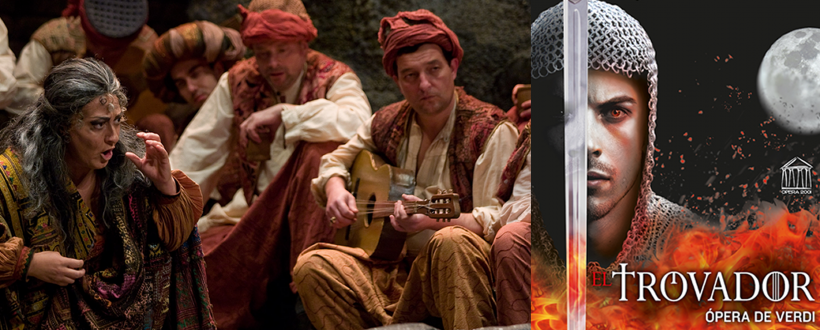
Il Trovatore
Original Title: "Il Trovatore"
Opera in 4 acts by Giuseppe Verdi
Librett by Salvatore Cammarano and Leone Bardare
Original version in Italian with subtitles (optional)
Cast
Musical Director : Martin Mázik
Stage Manager : Roberta Mattelli
Musical Director : Luis Miguel Lainz
Scenography : Alfredo Troisi
Customes : Arrigo (Milán - Italia)
Wigs : Mario Audello (Turín - Italia)
Shoes : Calzature Epoca (Milán – Italia)
Soloists, Choir and Orchestra from Opera 2001
CONDE LUNA, Baritone
Paolo Ruggiero, Nicola Ziccardi
LEONORA, soprano
Chrystelle Di Marco, Yeonjoo Park, Irina Stopina
AZUCENA, mezzo
Jiujie Jin, Maria Ermolaeva, Chinara Shirin
MANRICO, tenor
David Baños, Haruo Kawakami, Vicente Romero
FERRANDO, bass
Viacheslav Strelkov
INÉS, soprano
Leonora Ilieva
RUIZ, tenor
Federico Parisi
VIEJO GITANO, Baritone
Aurelio Palmieri
* Cast still to be determined, this list is merely a guide based on our latest production. Auditions in progress to determine the final cast
Play's presentation
A Gypsy being burned at the stake is the beginning of a terrible revenge. Accused of bewitching the younger son of the old Count of Luna, she is condemned and devoured by the flames despite her innocence.
In her agony she demands revenge to her daughter Azucena who kidnaps the second son of the Count of Luna, of name Manrico, to burn him alive. Because of her alienation, instead of throwing that child, by mistake, it is her own that ends in the flames.
Manrico has been raised since then as the son of Azucena. Years later the Count of Luna, son of the old Count of Luna and brother of Manrico, the abducted child, obsessively loves Leonora, maid of honor of the princess of Aragon, with little fortune because she is in love with Manrico.
Between the two exists a fatal rivalry that will be solved only with death. This is the only way the gipsy will get her revenge.
Synopsis
ACT I "THE DUEL"
SCENE I
In the atrium of the castle of Aliaferia, in Zaragoza, capital of the medieval kingdom of Aragon, the old Ferrando who was the comrade-in-arms of the late Count of Luna and at that moment is the commander of his son's army, tries to keep his subordinates awake, in spite of being late in the night, as it so requires the situation of the kingdom, almost in state of civil war. Meanwhile, the young Count of Luna wanders uneasily through the gardens of the royal palace, casting nostalgic glances at the window of the noble lady Leonora de Sargasto. Ferrando begins to tell his men stories about the strange and legendary events that happened many years ago... A long time ago, a gypsy came to the cradle of the sons of the Count of Luna, bewitched one of the little ones and the innocent child fell sick as a result of the spell. The Gypsy was chased, trapped and burned alive at the stake. In revenge, the daughter of the unfortunate woman who witnessed the horrendous execution of her mother, kidnapped the earl's youngest son and sentenced him to the same frightful death that her mother suffered. The gypsy's daughter could never be captured. Would you recognize her? Ask Ferrando's men. The squire nods ...
SCENE II
In the garden of the palace, Ines, the confidant of Leonora, tries in vain to persuade her mistress to return to her quarters. But Leonora is thinking of a mysterious knight she met in the tournament, the one who beat all her opponents, never raised the visor and disappeared in the midst of the confusion of the war leaving in her heart an unforgettable memory. Every night under her window you can hear the love song of an unknown knight, naming her with affectionate devotion. Leonora is sure that it is him, but it seems that tonight will also pass without the longed-for encounter... The Count of Luna appears from the night shadows, determined to finally confess his love to Leonora. The sound of a lute interrupts his thoughts and the unknown troubadour raises his voice.
Luna boils in anger. Leonora goes to meet the count, but the mistake only lasts for a moment: the gentleman comes out of the bushes, she realizes her mistake and throws herself in the arms of the troubadour as the two men face menacing each other. Luna demands the stranger to identify himself. Manrico lifts the visor and says his name. Luna is outraged: his rival in love is also his political enemy who he hates to death, the supporter of the false aspirant to the throne, Duke of Urgel. Leonora tries in vain to separate the two enemies, but the swords are already drawn and a duel begins that both know will be to death.
ACT II "THE GYPSY"
SCENE I
The gypsies have settled their camp in the mountains of Vizcaya. The glow of the fires illuminates the night. The gypsy girl Azucena is sitting, lost in thought and melancholy. At her side is Manrico, the troubadour whom he never fails to reproach for having forgiven the Count of Luna for his inferiority: if he had been in his place, he would never have proceeded with equal lordship. Manrico admits that an incomprehensible feeling stopped his hand. The reflection of the flames makes Azucena relive the terrible scenes of days past: the death of her mother at the stake and her last word: "Avenge me!". Manrico is prey to a disturbing foreboding and insists that the gypsy tells the whole truth. Azucena describes her own emotions while she witnessed the horrible spectacle of a human being burned alive, even more terrifying if this being is your mother. Her agitation is increasing and, when she reaches the paroxysm, she tells how she managed to kidnap a son of the count in order to subject him to the same death and thus fulfill her revenge. But what is her horror when she discovers that, blind with fury and revenge, she had thrown her own son into the fire. Full of horror and tension, Manrico looks at her: "I am not your son? who am I?" The gypsy regains control of her senses and attributes her confusion to the terrible memories evoked. A messenger brings two important news: one , the fortress of Castellor has been taken and Manrico is entrusted with its defense, the other, Leonora, believing his loved one is dead, decides to take the veils in the neighboring convent of the Holy Cross. Manrico rushes to leave, he must send Leonora a sign that he is still alive, before the doors of the convent are closed forever behind her.
SCENE II
This same day Luna and his followers arrive in front of the convent to kidnap Leonora. When the cortege approaches, in the center of which Leonora marches toward the altar, Luna suddenly emerges from his hiding place, but Manrico and his faithful soldiers appear at the same time. The count does not believe his own eyes: Has the rival who he believed dead risen? The fight explodes again, the nuns flee in terror, Luna is surrounded and Manrico escapes taking the happy Leonora.
ACT III "THE GYPSY’S SON"
SCENE I
Count Luna who has left with a powerful army to reconquer the castle of Castellor is at the camp reviewing his troops before the assault on the castle, but his thoughts are on Leonora...
The capture of a gypsy woman causes great agitation. The count subjects her to a severe interrogation. The woman denies it all and claims to know nothing about the abduction and death of Luna's son, long ago. Ferrando recognizes the killer, who is also the mother of Count Luna's mortal enemy. The end of Azucena is sealed and that of her son will be sealed at dawn.
SCENE II
At the top of Castellor Castle, Manrico confesses to his beloved that the attack of the enemy is imminent and his handful of loyalists will have to face an army far superior in numbers. Accompanied by the solemn organ music that is heard from a chapel the lovers swear allegiance beyond death. Ruiz, Manrico's friend and comrade, arrives with the news that Manrico's mother is being held at Luna's camp and is going to be be executed. Manrico confesses to Leonora to be that gypsy's son. Only an attack by surprise could change Azucena's fate. With an enthusiastic battle song - the famous stretta - Manrico and his men are sent to meet their enemies.
ACT IV "THE TORMENT”
SCENE I
The assault fails, Manrico falls alive into Luna's hands and lies in the tower. Leonora who has managed to escape through the troops of Luna when they attacked Castellor, is guided by Ruiz to the walls, behind which Manrico's dungeon is supposed to be. A distant bell doubles sadly, invisible monks chant the "Miserere", the funeral song for those condemned to death. Leonora is horrified. Then the voice of Manrico is heard from his cell. With these elements - the male choir, the desperate song of Leonora and the melancholy farewell of Manrico - Verdi creates one of the most wonderful scenes of musical theater. The Count of Luna appears. His order is hard and precise: at dawn Manrico will die under the executioner's axe and Azucena will be burned at the stake. Leonora appears, pleading with the Count of Luna for the life of her beloved. The count rejects her until Leonora offers to pay the most expensive price: her own person. Leonora swears that as soon as Manrico is released, she will belong to him. But while the earl orders the cell door to be opened to allow Leonora to communicate his grace to Manrico, she swallows the poison that was hidden in her ring.
SCENE II
In the cell Azucena, exhausted, has stretched a little, next to her, Manrico is set on driving away the stormy visions that assail her. Finally, the gypsy falls asleep lulled by a tender song that reminds her of the distant mountains of her land. The door opens, Leonora runs to Manrico and begs her to leave the prison in a hurry. At what price did Leonora buy his freedom? - she asks, terrified. In the midst of the passionate outburst Manrico realizes almost too late of the supreme fidelity of his beloved: Leonora has fallen at his feet agonizing; The poison has had its effect. Luna enters the cell and without being able to master his anger realizes the inevitable end of his desires and the superiority of his mortal enemy. Manrico sends the last farewell to Azucena who has awakened in terror. The triumph of Luna is very brief, because she snatches the victory from him. Her supreme hour has come: "That was your brother!" – she casts into the face of the hated enemy. And as if speaking to the dead she exclaims: "Mother, you have been avenged!" The Count of Luna falls to his knees: in all his life he will not be able to banish from his heart the feeling of guilt.

